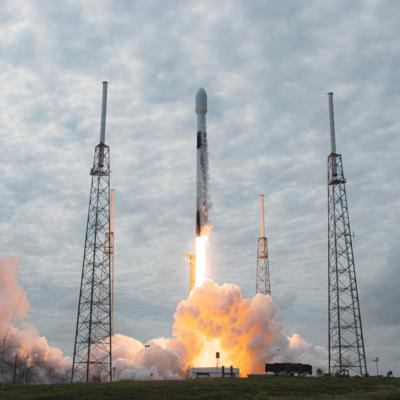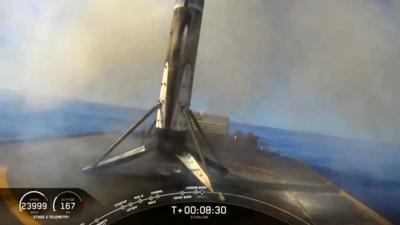Sun, Oct 25, 2020
SpaceX Has Landed A Falcon First Stage Rocket Booster 63 Times
On Saturday, October 24 at 11:31 a.m. EDT, 11:31 UTC, SpaceX’s Falcon 9 rocket launched 60 Starlink satellites to orbit from Space Launch Complex 40 (SLC-40) at Cape Canaveral Air Force Station in Florida.

Falcon 9’s first stage previously supported the GPS III Space Vehicle 03 mission in June 2020 and a Starlink mission in September 2020. Following stage separation, SpaceX landed Falcon 9’s first stage on the “Just Read the Instructions” droneship, which was stationed in the Atlantic Ocean. The Starlink satellites deployed approximately 1 hour and 3 minutes after liftoff.
This mission also marked the 100th successful flight of a Falcon rocket since Falcon 1 first flew to orbit in 2008.
SpaceX believes that fully and rapidly reusable rockets are the pivotal breakthrough needed to dramatically reduce the cost of access to space to enable people to travel to and live on other planets. While most rockets are expendable after launch — akin to throwing away an airplane after a one-way trip from Los Angeles to New York — SpaceX is working toward a future in which reusable rockets are the norm.
Of its now 100 successful flights of Falcon rockets, SpaceX has landed a Falcon first stage rocket booster 63 times and re-flown boosters 45 times. This year, SpaceX twice accomplished the sixth flight of an orbital rocket booster.

And, in the ten years since its demonstration mission, Falcon 9 has become the most-flown operational rocket in the United States, overtaking expendable rockets that have been launching for decades.
The difficulty of precision landing an orbital rocket after it reenters Earth’s atmosphere at hypersonic velocity is not to be overlooked — SpaceX remains the only launch provider in the world capable of accomplishing this task. At 14 stories tall and traveling upwards of 1300 m/s (nearly 1 mi/s), stabilizing Falcon 9’s first stage booster for landing is like trying to balance a rubber broomstick on your hand in the middle of a hurricane. While recovery and re-flight of an orbital rocket booster may now seem routine, developing Falcon such that it would withstand reentry and return for landing was generally accepted as impossible — and SpaceX learned many lessons on the road to reusability.
More News
From 2023 (YouTube Version): Legacy of a Titan Robert (Bob) Anderson Hoover was a fighter pilot, test pilot, flight instructor, and air show superstar. More so, Bob Hoover was an i>[...]
Get The Latest in Aviation News NOW on Instagram Are you on Instagram yet? It's been around for a few years, quietly picking up traction mostly thanks to everybody's new obsession >[...]
Aero Linx: B-52H Stratofortress The B-52H Stratofortress is a long-range, heavy bomber that can perform a variety of missions. The bomber is capable of flying at high subsonic spee>[...]
Altimeter Setting The barometric pressure reading used to adjust a pressure altimeter for variations in existing atmospheric pressure or to the standard altimeter setting (29.92).>[...]
"Knowing that we play an active part in bettering people's lives is extremely rewarding. My team and I are very thankful for the opportunity to be here and to help in any way we ca>[...]
 Classic Aero-TV: Remembering Bob Hoover
Classic Aero-TV: Remembering Bob Hoover ANN FAQ: Follow Us On Instagram!
ANN FAQ: Follow Us On Instagram! ANN's Daily Aero-Linx (05.15.24)
ANN's Daily Aero-Linx (05.15.24) ANN's Daily Aero-Term (05.15.24):Altimeter Setting
ANN's Daily Aero-Term (05.15.24):Altimeter Setting Aero-News: Quote of the Day (05.16.24)
Aero-News: Quote of the Day (05.16.24)




